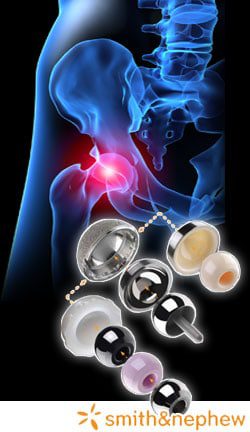
Medical device maker, Smith & Nephew, just issued a recall for a metal-on-metal hip implant component, a part of one of its all-metal hip replacement systems. According to Reuters, the recall followed reports of a “higher than normal level” of patient problems with the device associated with the defective component. Reuters pointed out that the […]
 Medical device maker, Smith & Nephew, just issued a recall for a metal-on-metal hip implant component, a part of one of its all-metal hip replacement systems.
Medical device maker, Smith & Nephew, just issued a recall for a metal-on-metal hip implant component, a part of one of its all-metal hip replacement systems.
According to Reuters, the recall followed reports of a “higher than normal level” of patient problems with the device associated with the defective component. Reuters pointed out that the news will likely contribute to the ongoing controversy over metal-on-metal hips; however, Smith & Nephew argues that the issues with its system differ from what is being seen with other, similar, all-metal devices.
A Smith & Nephew spokesman described the problem as affecting a small number of patients and involving infections, fractures, and dislocations, but that there was no evidence of “metallosis,” the build of metal debris in patients’ bodies that can lead to significant adverse effects. In response to customer complaints, said Reuters, Smith & Nephew is withdrawing the optional metal liner, or cup, which is a component of its R3 Acetabular System. Surgeons are able to continue using the system with alternative non-metal liners; Smith & Nephew said it did not foresee any surgery delays.
The decision came after a review of clinical results revealing that 1.6% of patients implanted with the system required revision surgery annually, above the 1% guideline set by Britain’s National Institute for Health and Clinical Excellence, said Reuters. Smith & Nephew is based in Britain. “We regularly review the effectiveness of our products and are not satisfied with the clinical results of this component,” Andy Weymann, Smith & Nephew’s chief medical officer, told Reuters.
Some 7,700 of the metal liners have been implanted since the component was released in 2007, said Reuters. Procedures using the now-recalled component accounted for less than 1% of the firm’s global hip implant revenue in 2011. Meanwhile, we recently wrote that Smith & Nephew reported a drop in sales of its metal-on-metal hip implant devices. According to the company, hip implant sales were down 2% in the first quarter of 2012, largely because its Birmingham Hip Resurfacing System suffered from an association with other metal-on-metal hip replacement devices.
All-metal hip implants have been the subject of safety concerns since the August 2010 global recall of DePuy Orthopaedic’s ASR hip implants. It is believed that all-metal hip replacements, which consist of a metal acetabular cup and metal femoral head, can shed minute particles of cobalt and chromium into surrounding tissue, and even into a patient’s blood stream, leading to metallosis. The condition causes the death of tissue around the implant, including bone and muscle; metal ions can cause irreversible damage to DNA in cells, and have been found throughout he body following hip replacements, including in the marrow, blood, liver, kidneys, and bladder.
Last May, the U.S. Food & Drug Administration (FDA) asked 21 makers of metal-on-metal hip implants, including Smith & Nephew, to conduct safety studies of their devices. This month, the agency will convene a panel of outside advisers to discuss the problems related to metal-on-metal hip replacements.
In 2007, Smith & Nephew recalled about 185 Birmingham hip resurfacing system implants over improper packaging by a subcontractor. The packaging error caused an array of different sized acetabular cups to become mixed and mislabeled. A number of patients complained of having received wrong-sized hips, which forced some to undergo a revision surgery to remove and replace the poorly fitting device.


